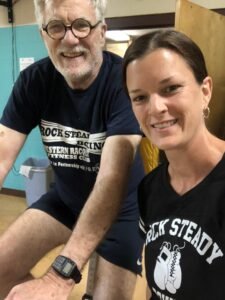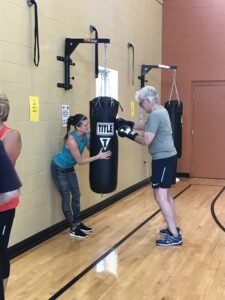Looking in From the Outside: My Personal Journey with Parkinson’s Disease
In honor of April being Parkinson’s Awareness month, recognizing the 5-year anniversary of our Rock Steady Boxing program, and celebrating my 5th year as a Rock Steady Boxing coach, I’d like to share my personal story about Parkinson’s Disease and the impact it has had on my life.
Meet Ross
I met my stepdad, Ross, 27 years ago in 1996. It was a struggle at first, being a 14-year-old kid dealing with my parent’s divorce and feeling like I didn’t “need another dad” in my life. But with time, we got to know each other, and he became part of my family. Pretty early on, I learned that we were similar in many ways. We both loved adventure, thought in pictures, liked to know the “why behind the what”, and both had process-oriented, analytical ways of thinking. The latter of which actually came in handy when he taught me how to drive stick when I was learning to drive in high school. He explained the mechanics of what was happening to the car when I used my left foot to push the clutch in and my left foot to release the gas pedal. He painted a picture in my brain that helped me visualize what was happening, and boom! All of a sudden I was driving a stick shift transmission. He was always good at explaining things like that to me, and we connected in that way, among others.
Ross was definitely an adventure guy—I often described him as “a mountain man” to my friends because he lived in Alaska, always had a big beard, loved hunting, fishing, hiking, and even had his own float plane. He was an orthopedic surgeon in Anchorage when my mom met him, and continued to work as a doctor until he retired at the age of 72. That profession provided him with the opportunities to do things like become a private pilot with his own plane, but it was his sense of adventure and passion for taking on a challenge are what fueled him.
Adventures together
After my mom moved to Alaska with him when I was in high school, I visited as much as I could on school breaks. I even spent my entire summer up there with them after my freshman and sophomore years in college. Although we had many great adventures, flying with Ross was one of my favorite things to do. He and I would wake up in the morning and make a plan for the day. Maybe it was flying to a remote place to go for a hike or fish, hunting down some glacier views from the air, or trying to get a glimpse of Mt. Denali on a sunny afternoon.
Flying with him was such a process, and I loved every second. He’d file his flight plan with Anchorage ground control a few hours before we took off, then we’d spend an hour going through what he called the “pre-flight” process—and he taught me everything. We’d check every single screw, nut, and bolt to make sure they were tight and secure. Check the oil in the plane and change it if necessary. Climb up onto the plane's wings and fill each fuel tank with gas. Pump any excess water out of the floats to make sure we didn’t weigh too much. After several trips, he and I had this process down to a science, and after we each finished our pre-flight tasks, we’d be ready to take off.
With our life vests and headphones on, Ross would start the engine and we’d begin our taxi across Campbell Lake, one of two aviation lakes in Anchorage that he and my mom lived on. Just walk out the back door, hop in the plane, and we could go anywhere. This became one of my favorite life experiences and memories.
Hearing Ross talk to the airport tower was something I couldn’t get enough of. I’d try to translate what he was saying to them and figure out where we were headed just based on the terminology he used. I remember even memorizing the aviation alphabet so I could figure it out! We’d take off high in the sky, travel to our destination, and land softly somewhere in the middle of nowhere. Many, many days up in Alaska were spent this way, and each trip was logged. I remember it was the last thing he’d do after we had landed and returned home. Every. Single. Time. He kept a small spiral notebook in the seatback pocket with a pen. He’d record the date, time, weather, where we went, and who he was with. In fact, we still have that journal, and every flight he ever took is written down, beginning in 1982 until his last flight in 2016. A few years ago at Thanksgiving, I pulled it out and we went through it, reminiscing about many of the trips we had taken together and with other family members, telling the story of each day, and painting a picture in our minds of each one.
He still loves doing that to this day, telling stories and reminiscing about the memories he made and those we’ve all made together as a family. I think it helps his memory, and it always makes him smile—even talk sometimes! In 2018, a lot changed for Ross and our family. In May of that year, he was diagnosed with Parkinson’s Disease.
A Parkinson’s Disease diagnosis
My Mom had suspected it, and we had all noticed changes in his movement and cognitive abilities, but they were very slight and could've been explained away with “it’s just old age”. But I think he knew something had changed too, because two years prior to that in 2016, he decided to sell his float plane and give up his pilot’s license. He told us it was because he didn’t feel as mentally clear or sound to be flying any longer.
2018 was the year it really began. A man I had grown to love, who taught me so many things, who had helped so many people, was changing. As an orthopedic doctor, Ross completely understood how the body worked and operated. He understood movement, rehabilitation, injury, and the importance of exercise. So for me, watching his brain and body start to change in ways he couldn’t control seemed like a cruel joke. The man lived for adventure, being outside, exercising, and working. But his Parkinson’s diagnosis had other plans.
That’s the thing with Parkinson’s Disease—it's non-discriminating. It affects all people regardless of age, gender, background, family health history, and life experiences. No one knows exactly why it occurs and or who it chooses to affect, despite countless studies and research. But what we do know is that it affects everyone differently both in its progression and in its symptoms. It’s a selfish, progressive disease that has no rhyme or reason and as of today, no cure. However, in my stepdad’s case, he didn’t let that diagnosis bother him. In fact, I don’t really know if he ever accepted or admitted he had Parkinson’s. He continued to move and exercise and stayed active.
Western Racquet & Fitness Club & Rock Steady Boxing
In addition to Ross’ diagnosis, 2018 was a year of change for me, and the timing of some things was very coincidental—or maybe it was some kind of divine intervention? 2018 was my first full year working and teaching fitness classes at Western Racquet & Fitness Club.
We had just launched a new program called Rock Steady Boxing in April of that year, a class specifically for people living with Parkinson’s Disease. I had been volunteering for the class on a weekly basis for only a month when Ross received his diagnosis in May. Although the news was very hard to hear and accept, I felt hopeful because I could help him in some way!
At the time our class was small but growing. We more than doubled the number of participants we had fighting back against PD by the end of that first year, which allowed me to gain loads of experience and education just by working with and alongside them. I was hungry for anything I could learn from our boxers because I thought they could help me relate to and help my stepdad with what he was going through in his own journey.
Shortly after receiving his PD diagnosis, I told my mom and Ross about Rock Steady Boxing and invited them to join our classes while they were visiting me in June 2018. Although it wasn’t the same heavy-lifting “gym rat” routine Ross had adopted over the years, he enjoyed it, and so did my mom. I think it gave her some hope actually, that “maybe this wasn’t the end of the world”.
At the time, they were living in Rhode Island, a place my mom had wanted to move to after retirement. I was able to help them find a local Rock Steady class there. Later that year, I became a certified Rock Steady Boxing coach and even got to attend some classes with my stepdad while visiting them in Rhode Island. They continued to go a few times a week for the next year or so, and I truly believe it helped him slow the progression of the disease and keep moving. But 2019 had other plans, and things started to change again.
Another devastating diagnosis
In 2019, my family learned about Lewy Body Dementia—the second most common type of progressive dementia behind Alzheimer's Disease. Ross’s neurologist said his most recent brain scan proved he had it. Google searches displayed many of the symptoms he was experiencing and also told us the average life expectancy from the date of diagnosis was just 4-7 years. This news was different than learning he had Parkinson’s. He was only 76 at the time, had lived a long, active life already with much longer to go, and was otherwise healthy and strong. We didn’t know what to expect or what the coming months or years would look like. As his caregiver, my mom knew she needed help and could see his symptoms progressing, so they moved here to Green Bay as soon as they could to be closer to family.
It’s been almost 4 years since we learned Ross has Lewy Body Dementia and 5 years since we learned he has Parkinson’s Disease. A little more than a year ago we moved him into an assisted living facility that specializes in memory care and, after some trial and error, he’s settled into his new life and this new version of himself. He doesn’t use the same float plane pilot voice as he used to, and can’t remember the jargon he used to use either. But when we tell him all about it and imitate it, he smiles and even laughs sometimes!
Living with Parkinson’s
What I’ve learned from Ross and so many of the boxers in our Rock Steady Boxing class is that people with Parkison’s are still themselves, just a different version. Parkinson’s Disease is something a person lives with, and each day is different, and every person that has it is different. The symptoms look different for each person, and the progression of the disease is also different for each person.
What we do know, is that continuing to exercise and socialize helps. Studies have shown that rigorous exercise focused on large muscle movement, balance, core strength, and rhythm positively impacts movement associated with the activities of daily living. There is also more recent evidence that certain kinds of exercise are “neuro-protective” which means they actually slow down disease progression. It’s not hard to see how much of a positive impact Rock Steady Boxing has had on our boxers and on my stepdad Ross, and I am so very grateful for that! While we may not have a cure for Parkinson’s yet, we know that we can help to slow down the disease's progress with a program like Rock Steady.
I hope telling my story helps you understand Parkinson’s Disease a little bit better, and if you know someone with PD, or are a caregiver for someone living with PD, reach out for resources. Learn all you can about it, come to Western Racquet and observe one of our Rock Steady Boxing classes, and continue to help these individuals live the best life that they can.
If you’d like to learn more about Rock Steady Boxing or find out how you can participate in our program at Western Racquet & Fitness Club, visit our website at or call or email the program director, Kari Merrill at kari.merrill@westernracquet.com or 920-497-1161.




